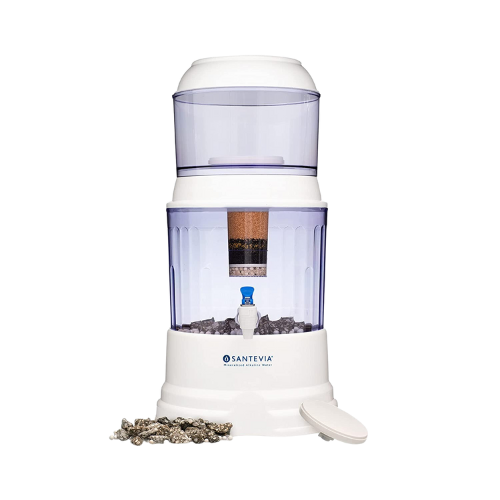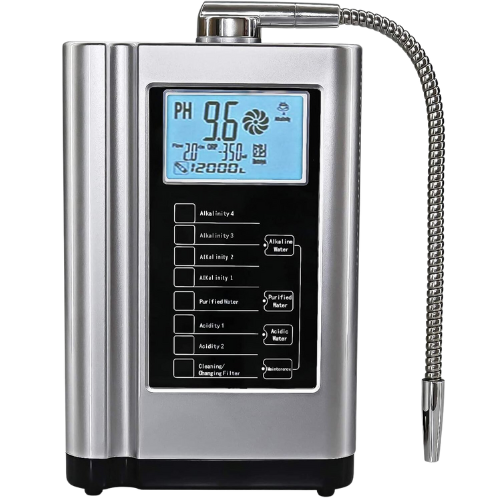
Welcome to our comprehensive beginner's guide to alkaline water and its benefits. In recent years, there has been a growing interest in the concept of alkaline water, touted for its potential health benefits. In this guide, we will delve into the science behind alkaline water, explore its unique properties, and examine the potential benefits it may offer. So, let's embark on this journey to understand the fascinating world of alkaline water and how it can impact your overall well-being.
Understanding Alkaline Water Subtitle: What is Alkaline Water?

Before diving into the benefits, it's crucial to grasp the concept of alkaline water. Alkaline water refers to water with a high pH value, typically above the neutral pH of 7.0. This type of water contains a higher concentration of alkaline minerals such as calcium, potassium, and magnesium. The alkaline nature of the water can be attributed to the presence of these minerals and various ionization processes.
The Science Behind Alkaline Water Subtitle: The Alkali Connection

To comprehend the potential benefits of alkaline water, it's essential to understand the concept of alkali. Alkali refers to substances that can neutralize acidity and help maintain a balanced pH level in the body. Alkaline water, with its higher pH value, is believed to possess alkali properties that can counteract excessive acidity and promote overall well-being.
Potential Benefits of Alkaline Water Subtitle: Boosting Hydration

One of the primary advantages of alkaline water is its ability to enhance hydration. The smaller cluster size of alkaline water molecules allows for improved cellular penetration, facilitating better hydration at a cellular level. Staying properly hydrated is vital for maintaining optimal bodily functions, supporting digestion, circulation, and overall energy levels.
Balancing pH Levels
Maintaining a balanced pH level within the body is crucial for overall health. An excessively acidic environment can lead to various health issues. Alkaline water is believed to help neutralize acidity, contributing to the restoration of the body's natural pH balance. By incorporating alkaline water into your routine, you may support your body's efforts to maintain a healthy pH level.
Antioxidant Properties
Alkaline water may also possess antioxidant properties. Antioxidants play a significant role in neutralizing harmful free radicals in the body, which are associated with aging and various diseases. By consuming alkaline water, you can potentially increase your antioxidant intake and contribute to the protection of your cells from oxidative stress.
Incorporating Alkaline Water into Your Routine Subtitle: Choosing the Right Source

When incorporating alkaline water into your routine, it's essential to consider the source. Various methods, such as ionization and mineral additives, can increase the pH level of water. Bottled alkaline water and home filtration systems are two popular options. Research the source and choose a reputable brand or system that ensures the highest quality and safety.
Santevia Gravity Water System - Countertop Model - Alkaline and Fluoride Filter
AquaGreen Alkaline Water Machine AG7.0
Hydration Optimization
To maximize the benefits of alkaline water, it's crucial to ensure adequate hydration throughout the day. Aim to drink at least eight glasses of water daily, and consider replacing some of your regular water intake with alkaline water. Additionally, consuming a balanced diet rich in fruits, vegetables, and alkaline-promoting foods can further support hydration and overall well-being.
Addressing Potential Concerns and Considerations
Potential Side Effects and Moderation
While alkaline water has many potential benefits, it's important to approach its consumption with moderation and be aware of potential side effects. Some individuals may experience gastrointestinal discomfort or changes in their body's pH balance when consuming excessive amounts of alkaline water.
Quality and Testing
When selecting alkaline water sources, it's crucial to prioritize quality and safety. Look for brands or filtration systems that undergo rigorous testing and adhere to industry standards. Independent third-party certifications can provide added assurance of water quality. Regularly check the pH level of your alkaline water using test kits to ensure consistency and effectiveness.
Debunking Myths and Misconceptions Subtitle: Alkaline Water as a Cure-All

It's important to approach the topic of alkaline water with a critical mindset and be aware of any exaggerated claims. While alkaline water has potential health benefits, it should not be considered a magical cure-all solution for ailments or diseases. It is best viewed as a complementary element to an overall healthy lifestyle that includes a balanced diet, regular exercise, and proper medical care.
Weight Loss and Alkaline Water
Another common misconception is the idea that alkaline water alone can lead to significant weight loss. While staying hydrated with alkaline water may support weight management efforts, it is not a substitute for a well-rounded approach that includes a healthy diet and regular exercise. Maintaining a calorie deficit and making sustainable lifestyle choices remain the key factors in achieving and maintaining a healthy weight.
In conclusion, alkaline water with its high pH value and potential alkali properties offers several benefits that can positively impact your health and well-being. From boosting hydration and balancing pH levels to providing antioxidant properties, incorporating alkaline water into your routine may be a valuable addition to your healthy lifestyle. However, it is important to approach alkaline water consumption with moderation, choose reputable sources, and be aware of potential side effects. By embracing alkaline water as part of an overall wellness strategy, you can optimize your hydration and support your body's natural functions.
Remember, before making any significant changes to your diet or lifestyle, it is always advisable to consult with a healthcare professional to ensure it aligns with your individual needs and medical considerations.
.png)



Comments